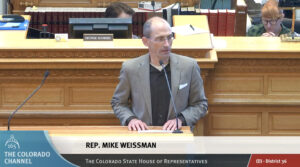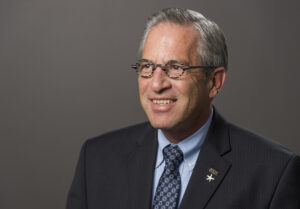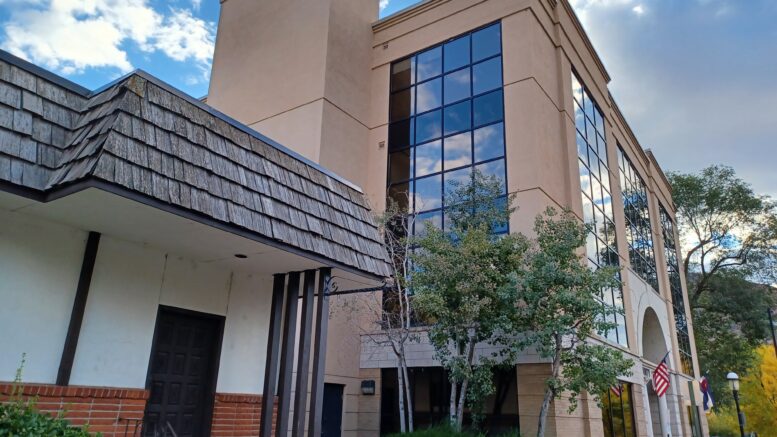Proposition HH offers Colorado commercial property owners a chance of subtracting billions of dollars from escalating property-tax bills over the next decade. But in a sign of the complexity and divisiveness of the measure, it’s difficult to find business groups that are backing it.
One week before ballots begin hitting mailboxes for the November election, most business groups have either decided to stay out of the Prop HH fight or voice their opposition. The stance reflects a feeling — as voiced by NAIOP Colorado President Caitlin Quander, whose organization of commercial property owners decided to remain neutral — that the directs boosts that businesses could see are just too small to rally around as compared to potential drawbacks.
Some of the biggest support and funding for the legislatively referred question so far comes from education groups and from groups tied to the Democratic Party, pitting them in contrast to the Republican and fiscally conservative organizations that oppose Prop HH. And most of the public discussions center around the short-term effect of the proposal on homeowners’ soaring property-tax bills versus the long-term degradation to Taxpayer’s Bill of Rights refunds, making this in some senses a more ideological than business-focused battle.
To be sure, though, the measure will directly impact any business that owns its buildings — an impact that grows with property value. But because of the way the measure made its way to the ballot, the uncertainties around its full impact and the competing loss of tax refunds that accompanies the downward impact on property taxes, Prop HH is creating very mixed feelings.
How Prop HH came about
“While the small decrease in property taxes with Proposition HH is beneficial to commercial real estate, our organization felt that the longer-term questions and complexity of Proposition HH offset those savings,” Quander told The Sum & Substance. “This includes the complexities of administration, the backfill to local governments and the changes to TABOR refunds. We decided the pros didn’t outweigh the cons, so we remain neutral on the measure.”

Colorado state Rep. Mike Weissman speaks on the House floor in May during the debate over putting Prop HH on the ballot and offering equal TABOR refunds across the board.
A week before the end of the 2023 legislative session, Gov. Jared Polis and legislative Democrats introduced Senate Bill 303, the measure that established Proposition HH, and they passed it on the final day after House Republicans walked out when debate on the proposal was limited. A companion bill, House Bill 1311, triggers $661 TABOR refunds for all Colorado taxpayers next year rather than tiering the refunds based on income — a change that will boost refunds for people earning less than $100,000 but cut them for those making more —but only if voters OK Prop HH.
Polis has argued since its introduction that Prop HH is a response to the soaring property-tax bills Coloradans face this year as residential-property assessments skyrocket — with home values rising an average of 44% statewide, according to the Colorado Association of Realtors.
If passed, the proposal would reduce residential property values $50,000 this year and $40,000 every subsequent year through 2032 and cut the state’s residential-property assessment rate (which already is down slightly in 2023 and 2024, thanks to a previous bill) from 7.15% to 6.7%. It also would cap the annual rise in property-value collection by local governments to the amount of inflation, though local governments could override that by holding a public hearing and having the elected board then approve the change in law.
How Prop HH works
Non-residential property-value assessments, which sit at a reduced 27.9% assessment rate this year but return to 29% in 2024, would decline gradually to 26.9% by 2030 and would be cut by an extra $30,000 just for this year under Prop HH. Agricultural land would fall to 26.4% and a new designation of renewable energy agricultural land — property featuring both ag and solar panels, say — would be assessed at 21.9% of value.

A view of buildings in downtown Denver
Prop HH also would raise the TABOR cap for state revenues 1% annually, meaning the state could keep and spend about $166 million more this fiscal year but that by 2032 the cap would be $2.2 billion higher because of annual compounding. As much as 20% of revenues the state would keep would go to backfill property-tax revenues foregone by local governments — though backfills would stop when any government grows property value by more than 20% versus 2022 levels — and the rest would go to the State Education Fund.
Legislators could choose to continue the changes made by Prop HH after 2032, meaning the TABOR cap would continue to rise indefinitely. They also could look then at changing the property-tax assessment rates for various classes of property as long as the changes do not produce a net property-tax increase.
Property taxes versus TABOR refunds
An analysis by the Common Sense Institute determined that while the potential property-tax revenue reductions under Prop HH total $9.92 billion through 2032, the reduction in TABOR refunds should reach $9.9 billion, rendering the measure a net tax increase. Broken down by household, the average homeowner would see $4,641 in property-tax savings over the next decade but lose $5,119 in TABOR refunds, equaling a net tax increase of $478 during that time.
Such breakdowns for individual businesses are harder to pin down, owing to the uncertainty of which local governments will bypass the annual assessment-value-increase caps, and the state’s Blue Book analysis pegs the 2023 reduction at anywhere from $34 to $503 per $1 million in value. CSI estimated that a $1 million property growing at 8% annually would save $15,200 to $17,500 over the course of a decade.
During a Sept. 7 debate at the Aurora Chamber of Commerce, Democratic Rep. Mike Weissman, one of the sponsors of SB 303, asserted that the reduction in the assessment rate, combined with savings from local property-tax caps, would be significant. A property worth $100 million, he argued, could save $3 million cumulatively over the next 10 years.
“Against higher property values, small reductions can add up to large dollars quickly,” Weissman told attendees.
Business groups differ on impact
During a committee hearing in May, Colorado Concern Director of Public Affairs Anneliese Steel estimated that commercial-property owners could save $3.5 billion through 2032 with the cut, as her organization was the foremost business group pushing for passage of SB 303. But when asked for further analysis of the benefits of Prop HH in late September, Steel said that Colorado Concern was “not available for comment on Prop HH.”

Tony Gagliardi is Colorado state director for the National Federation of Independent Business
The Colorado chapter of the National Federation of Independent Business, meanwhile, is running radio and digital ads against Prop HH because it believes small-business owners will be hurt more by the loss of TABOR refunds than they will be aided by lessening of property-tax hikes. Property taxes will continue to rise even with the passage of Prop HH and lead to increased rent costs for businesses that don’t own their buildings, and the TABOR refunds that mom-and-pop stores used to put toward their companies won’t be available anymore, state director Tony Gagliardi noted.
“The bargain you are asking voters to make is to say on one hand for a very disparate break on your property taxes, you are giving away on the other hand your ability to cut taxes 10 years down the road,” said Lang Sias, CSI’s Mike A. Leprino Free Enterprise Fellow who co-authored his organization’s analysis of the ballot initiative. “There’s that old saying that some money is just too expensive to take. You’re giving up a hell of a lot of money here.”
What’s next
Whether voters approve or reject Prop HH, the debate on property taxes will continue. Advance Colorado Action, the fiscally conservative group leading the No on HH campaign, has gotten approval to begin collecting signatures for a potential 2024 ballot initiative that would cap increases in statewide property tax revenue from all classes of property at 4% annually.
Quander, a shareholder at Brownstein Hyatt Farber Schreck LLP, said that if the measure fails, she hopes the Legislature will pursue more substantial decreases to commercial property taxes in 2024, particularly given the fact that assessment rates for nonresidential properties remain at levels four times those of residential properties. She also would hope that, regardless of the outcome, elected officials have more discussion about the increasingly complex nature of property taxation, which has expanded the two classes of properties in 2020 to a potential nine classes of properties if Prop HH passes, including separate rates for first and second homes.
“With the November 2020 repeal of the Gallagher Amendment (which required nonresidential properties to produce 55% of all property-tax revenues), it opened the opportunity for the Legislature to reduce assessment rates,” Quander said. “With various constituent pressures, I expect that the Legislature will look at modifying the assessment rates in some capacity almost every session.”
